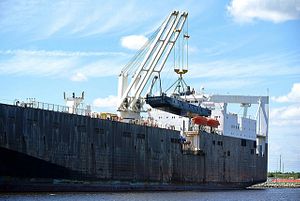What are the real economic costs of Chinese dominance in the South China Sea? Naval authorities have consistently cited the threat that China might pose to some of the world’s busiest shipping lanes if it manages to achieve territorial control of key areas of the South China Sea, and have used this threat as justification for naval deployments in the region.
James Laurenceson of Australia-China Relations Institute disagrees with these assessments, and has published an appraisal of the likelihood of shipping disruption and the cost that such a disruption might pose. Laurenceson argues that, rhetoric notwithstanding, the nations of East Asia do not regard a shipping disruption as particularly likely or particularly costly, that China is extremely unlikely to disrupt international maritime trade, and finally that shipping patterns will quickly and (relatively) painlessly adjust to any disruption.
Of these, he makes the least compelling argument for the first. The failure of Southeast Asian states to coalesce around U.S. freedom of navigation patrols is hardly dispositive; states fail to achieve multilateral cooperation around even critical interests for a wide variety of reasons.
But the other reasons for skepticism are sound. First is the centrality of maritime trade to China’s economic development strategy. China depends on maritime trade both on the export and the import side; exported goods go to Japan, the United States, and Europe, while imported materials come from Africa and the Middle East. Disruption to this trade hurts China first and foremost, whether in the medium or the short term. China is a member in good standing of the liberal international maritime order, for the reason that China benefits as much as anyone from that order.
Second, it is not obvious that a closure of the South China Sea to international maritime trade would have catastrophic, or even significant, economic effects. Based on work by John Quiggin on the impact of the closure of the Suez Canal after the Six Day War, Laurenceson argues that maritime trade would shift out of the South China Sea in case of a conflict, without incurring severe disruption in anything but the very short term. Japan and South Korea do not face the problem of routine, peacetime threat to their lines of maritime supply.
Third (a point not touched upon by Laurenceson), the ability of China to damage international trade in the Western Pacific is not necessarily tied to territorial control of the South China Sea. China can use long range weaponry to attack merchant ships traveling across the Pacific anytime it wants. Chinese aircraft, submarines, surface ships, and ballistic missiles can project power deep into existing shipping lanes, and into plausible alternative shipping routes. All China lacks in the will to do so, and China lacks the will to do so for extremely good reasons.
Laurenceson is almost certainly correct that American (and international) naval authorities have overstated the Chinese threat to routine, peacetime free navigation through the South China Sea. This is not to say that naval forces are never relevant to the protection of sea lanes, or that they are unnecessary for a variety of other operations across the combat spectrum. But the real threat to international shipping lies not in the control of a few islands in the South China Sea, but rather in the willingness of the Beijing government to undertake wartime measures to deter and disrupt merchant routes. Joint patrols in the South China Sea will not solve this problem; freedom of navigation ops will not solve it. But fortunately, as long as China continues to reap benefits from the global system of maritime trade, it is unlikely to pursue the disruption of that system for anything but short-term wartime contingencies.

































